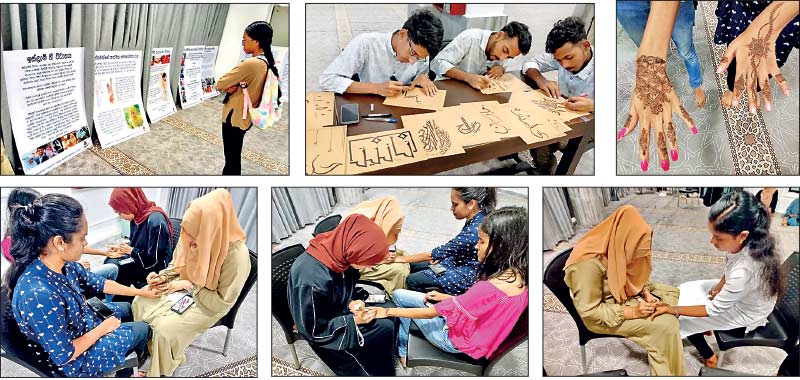Tuesday Feb 24, 2026
Tuesday Feb 24, 2026
Friday, 25 July 2025 05:28 - - {{hitsCtrl.values.hits}}

 By Tania de Silva
By Tania de Silva
On Monday evening, 14 July, the Kollupitiya Jumma Mosque opened its doors for something truly special—a mosque tour designed just for media professionals. Organised by the Centre for Islamic Studies Harmony Center, along with the Muslim Women’s Research and Action Forum and supported by Diakonia, the event was all about connection and understanding.
Journalists and storytellers were invited to step inside, ask questions freely, and experience the heart of Muslim faith and community life up close. It was a genuine effort to clear up misconceptions, encourage honest dialogue, and build respect between different communities.
During conversations at the event, attendees spoke about Ramadan, which is a sacred month of fasting, prayer, and reflection and how Muslims observe it all around the world. It commemorates the first revelation of the Qur’an to Prophet Muhammad (PBUH) and is considered one of the Five Pillars of Islam. From dawn to sunset, Muslims abstain from food, drink, and other physical needs, using the time instead for spiritual growth, increased charity, and community connection. While fasting is most visible, Ramadan is also about deepening one’s faith, practicing self-discipline, and nurturing empathy for those in need.
Globally, the month fosters a sense of unity across diverse cultures, from iftar meals in Jakarta to quiet night prayers in mosques. In educational settings, especially outside Muslim-majority countries, awareness of Ramadan is growing, prompting more inclusive policies around exams, school meals, and wellbeing. As a global tradition that blends spirituality with social responsibility, Ramadan continues to inspire millions towards mindfulness and compassion.
When asked whether it is mandatory to wear a head covering during prayers, journalist Asiff Hussein provided a thoughtful explanation. He clarified that while wearing a head covering is a common practice among many Muslims as a sign of respect and modesty, especially for women, it is not an absolute requirement for everyone during prayer. The essential focus in prayer is sincerity and concentration in worship. For men, covering the head is less emphasised, though some choose to do so out of personal or cultural preference. Overall, the practice varies across different communities and traditions, but the core principle remains that prayer is a deeply personal act of devotion, where intention matters most.
Several organisers explained that in the Sri Lankan Muslim context, keeping an Asaa (staff) is not just for physical support, it holds deep symbolic value. Drawing from the tradition of Prophet Muhammad (PBUH), who often used a staff during sermons and travel, the Asaa is regarded as a sign of religious authority, spiritual grounding, and wisdom. It reflects both respect for prophetic practice and the cultural dignity of elders and religious leaders within the community.
One thing that really stood out during the tour was seeing beggars and governors praying right next to each other, side by side, in the same holy space. In that moment, all social differences disappeared; everyone was equal before God. It was a powerful reminder that Islamic prayer brings people together no matter who you are or where you come from, highlighting humility.
From interactive discussions to Q&A sessions, attendees were encouraged to ask questions freely, explore Islamic customs, and connect with practicing Muslims. A warm and inclusive atmosphere was fostered through thoughtful offerings, personalised Arabic calligraphy, free mehendi (henna) painting, and access to Islamic literature.
One of the highlights was the culinary experience, allowing guests to taste traditional Muslim foods such as dates, samosa, and other sweets, deepening cultural appreciation through the universal language of food.
During the visit, it was noted that in Islamic practice, Muslims bow and prostrate exclusively in front of God. This act of bowing, known as sujood, is a deeply spiritual gesture symbolising devotion to the Divine alone. Unlike some other traditions, this physical expression of worship is directed solely to God, reflecting the core Islamic belief in the oneness of God and the importance of maintaining a direct, personal connection without intermediaries. This respectful practice highlights the focus on sincere faith and equality before God in the Muslim community.
This initiative came at a time when fostering mutual respect across faiths and cultures is more important than ever. For many participants, it was a chance to move beyond media headlines and experience the rich traditions and spiritual practices of Islam up close. Participants were educated on the role of the Qadi, who serves as a judge in Islamic law, responsible for resolving disputes and delivering justice according to Sharia principles. This included understanding how Qadis oversee important matters like marriage, divorce, and inheritance, applying Islamic teachings to guide fair and compassionate decisions within the community.
Amana Bank Orphan Care and Institutional Marketing Deputy Head Marshad Barry expressed their hope that this small step towards interfaith dialogue would inspire ongoing conversations, respectful reporting, and deeper empathy across Sri Lanka’s multicultural landscape.
A facilitator, Shifan Yang, explained the four important rituals observed in Islamic traditions surrounding death. These include Ghusl (the ritual washing of the body), Kafan (the shrouding of the deceased in simple white cloth), Salat al-Janazah (the funeral prayer performed by the community), and Janazah burial (the respectful and prompt burial of the body). Each of these rituals holds deep spiritual significance, emphasising respect for the deceased while providing comfort and closure to the grieving family and community.